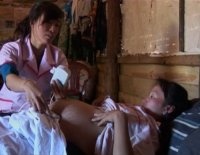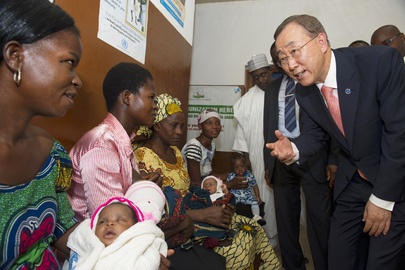

Unfortunately, in some of the World’s poorest nations, the answer is “No.” The importance of midwives gains recognition in a new report “The State of the World’s Midwifery, 2011: Delivering Health, Saving Lives,” released this week at a global conference in Durban, South Africa. The Report was co-authored by 20 international partners and the UN Population Fund, UNICEF, and World Health Organization.
Statistics are shocking at the disparity in death rates and complications between the least developed countries and the developed world. According to UNFPA, 900 women die every day and more than 34,000 others experience problems as a result of complications while giving birth. There is a shortage of midwives in 38 countries where they are most needed. The situation is critical in Cameroon, Chad, Ethiopia, Guinea, Haiti, Niger, Sierra Leone, Somalia and Sudan. High-refugee areas or areas of conflict only exasperate the problem of obtaining urgent health care, good nutrition, and clean water supplies.
UN News Centre & “State of the World’s Midwifery 2011 Report” Source
In some of the world’s poorest countries, as few as 13 % of all births are assisted by a midwife or a health-care worker with the necessary skills. “Up to 3.6 million deaths could be avoided each year in 58 developing countries if midwifery services are upgraded, If adequate facilities were accessible to deal with complications at their onset, many deaths could be averted: 61 per cent of all maternal deaths; 49 per cent of all stillbirths; and three in every five newborn deaths.
Each year, 358,000 women die while pregnant or giving birth, some two million newborns die within the first 24 hours of life and there are 2.6 million stillbirths. If midwives are in place and can refer the most severe complications to specialized care, up to 90 per cent of maternal deaths could be prevented.”
Boosting maternal health, and reducing child mortality are two Millennium Development Goals that Secretary-General Ban Ki-moon has targeted in his Global Strategy for Women’s and Children’s Health. The time for action is now to achieve these MDG goals.
In closing, I’d like to respond to a recent Facebook comment from a Fan of Diplomatically Incorrect who recommended stemming population growth in the least developed, impoverished counties where many cannot adequately care for their children. The goal was to reduce poverty, crime, and conserve earth’s resources and environment, all admirable ambitions.
However, in this scenario, I don’t believe the end result justifies the means. The solution will be provided when there is equitable health care, education, and the woman choosing her own destiny. If there is adequate maternal care and healthier babies, women will have fewer children and better health to care for their families, less need for expensive medicines they cannot afford, and less time away from a workforce to take care of a sick child. With an investment in health care and midwife training, these women can become more productive members of society.
Will the call for more midwives in the countries and communities that need them most be answered?
---By Susan Sacirbey
Become a Facebook Fan: Diplomatically Incorrect
Follow on Twitter @DiplomaticallyX
Related Reports:
diplomaticallyincorrect.org/c/humanitarian
diplomaticallyincorrect.org/c/diplomatically-incorrect
“Midwives”
diplomaticallyincorrect.org/films/movie/midwives/27435



